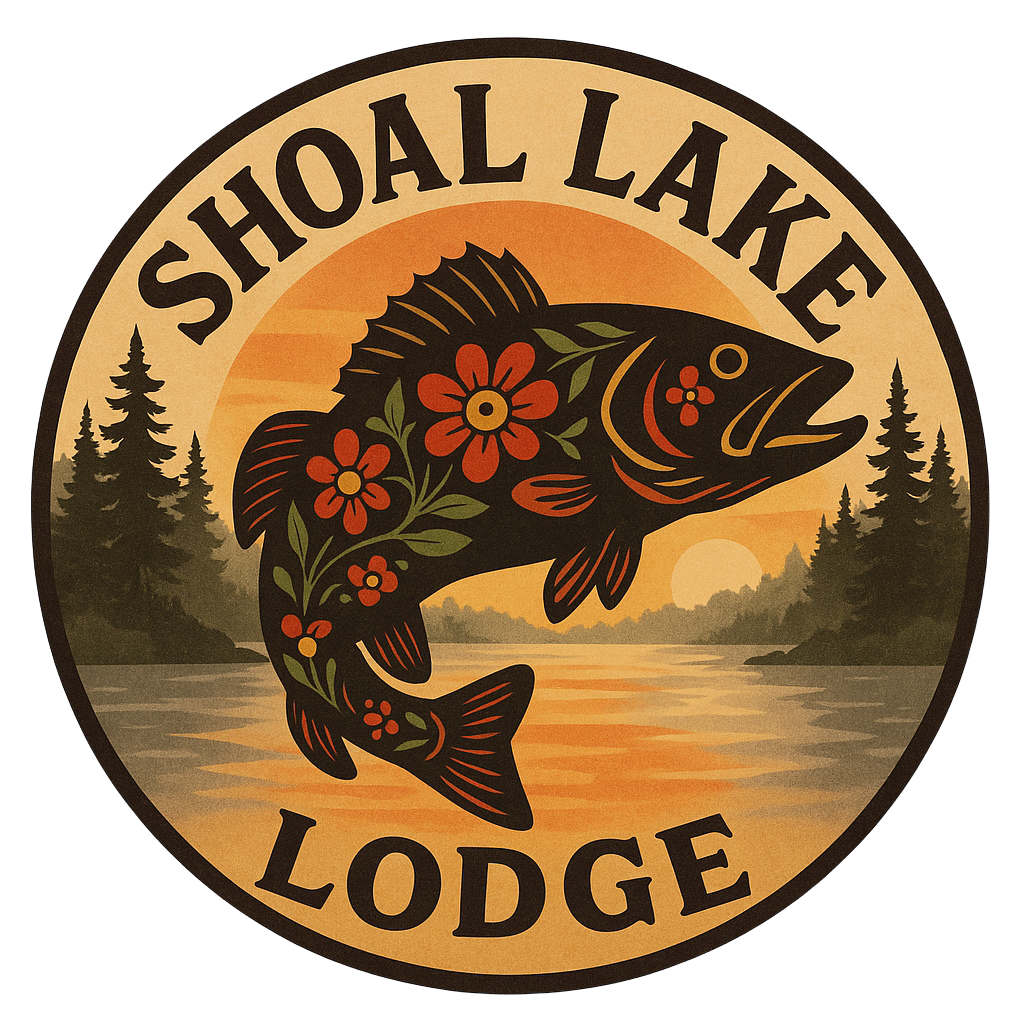Fishing & Lodge Guide – Shoal Lake Lodge
Shoal Lake Lodge is located on Cedar Island within Shoal Lake 39, above Ash Rapids in northwestern Ontario.
Whether you are an experienced angler or a first-time guest, this guide outlines everything you need to know before fishing at Shoal Lake—licensing, regulations, bait rules, conservation practices, and community respect.
Where You’ll Be Fishing
Shoal Lake is part of Fisheries Management Zone 5 (FMZ 5) under Ontario’s Ministry of Natural Resources and Forestry (MNRF).
Our area is listed as Shoal Lake (above Ash Rapids), which includes Shoal Lake 39 and Shoal Lake 40 territories and the waters around Cedar Island.
This portion of Shoal Lake is separate from Lake of the Woods. Different rules apply west of Ash Rapids.
Licence and Documentation
Before fishing, every guest aged 18 to 64 must have:
- A valid Outdoors Card
- A valid Ontario Fishing Licence (Sport or Conservation)
You can buy or renew licences online at huntandfishontario.com. Carry your licence and government-issued ID while fishing.
| Licence Type | Catch and Possession Limits | Best For |
|---|---|---|
| Sport Licence | Full limits (keeping fish) | Regular anglers |
| Conservation Licence | Half limits | Catch-and-release anglers |
Verified 2025 Fishing Regulations – Shoal Lake (Above Ash Rapids)
Source: Ontario Fishing Regulations Summary 2025 – FMZ 5 (“Shoal Lake above Ash Rapids – Kenora District”)
| Species | Open Season | Sport Licence (S) | Conservation Licence (C) | Notes |
|---|---|---|---|---|
| Walleye & Sauger | Closed all year | Closed | Closed | No harvest allowed |
| Northern Pike | Open all year (FMZ 5 general rule) | S-4 | C-2 | None between 70–90 cm; only one over 90 cm |
| Yellow Perch | Open all year | S-15 | C-10 | Abundant and great for eating |
| Lake Whitefish | Open all year | S-4 | C-2 | Often found in deeper water midsummer |
| Bass (Largemouth & Smallmouth) | Closed Jan 1 – Jun 30; Open Jul 1 – Dec 31 | S-4 | C-2 | Closed early season to protect spawning fish |
| Muskellunge | 3rd Sat in June – Dec 15 | S-1 (must be greater than 137 cm) | C-0 | Trophy fish; catch and release encouraged |
| Lake Trout | Closed in Shoal Lake | — | — | Found only in select nearby lakes |
| Sunfish / Crappie | Open all year | S-50 / 15 | C-25 / 10 | Not common in Shoal Lake |
Bait and Tackle Rules
Shoal Lake is within the Northwest Bait Management Zone (BMZ).
Rules include:
Live baitfish cannot be used or possessed.
Dead baitfish or leeches are allowed only if dead and preserved.
Do not transport bait or leeches into or out of the area.
Artificial lures and nightcrawlers are permitted.
Boating and Safety
A Pleasure Craft Operator Card (boating licence) is required to operate powered boats in Ontario.
Always carry lifejackets, paddles, bailer, whistle, and flashlight.
Shoal Lake has many rock reefs—use caution and keep maps handy.
Respect No Wake Zones near docks and shorelines.
Alcohol use is not permitted while operating a boat.
Catch and Release Tips
Use barbless hooks whenever possible.
Wet your hands before handling fish.
Support large fish horizontally, never by the jaw alone.
Keep photos brief (under ten seconds out of water).
Revive fish gently by moving them in the water before release.
Before You Go Fishing
Buy your Outdoors Card and Ontario Fishing Licence (required to fish).
Make sure your Pleasure Craft Operator Card is valid if you plan to drive a boat.
Review the current FMZ 5 fishing regulations.
Check your safety gear and boat equipment before heading out.
Know your species limits and seasons.
Bring reusable containers instead of single-use plastic.
Ask lodge staff if you are unsure about any rules or lake boundaries.
Conservation and Community Respect
Shoal Lake 39 and Shoal Lake 40 are Indigenous territories of the Iskatewizaagegan No. 39 Independent First Nation.
Please:
Respect the land, water, and wildlife.
Avoid trespassing on private or community property.
Dispose of all waste properly—nothing overboard.
Keep noise low near local residences or ceremonial areas.
Shoal Lake Lodge supports sustainable fishing and responsible tourism for future generations.
